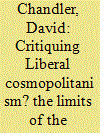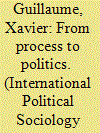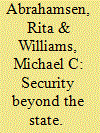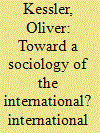|
|
|
Sort Order |
|
|
|
Items / Page
|
|
|
|
|
|
|
| Srl | Item |
| 1 |
ID:
087318


|
|
|
|
|
| Publication |
2009.
|
| Summary/Abstract |
Today there is a widespread recognition of the erosion of political community on the territorial basis of the nation-state. Instead, alternative framings of "being" political or of engaging in politics have argued for a more radical post-territorial space of political possibilities, of what it means to be political, and of how we envision political community. Through focusing on the two dominant articulations of post-territorial political community, liberal cosmopolitan and radical poststructuralist approaches, this article seeks to analyze the possibilities and limitations inherent in the search for political community beyond the boundaries of the nation-state. The aspiration to engage in, construct, or recognize the existence of a post-territorial political community, a community of broader humanity, has been articulated in liberal terms as cosmopolitanism, driven by global civil society, and in poststructuralist terms as "political cosmopolitanism,""cosmopolitanism-to-come" or the "solidarity of the governed," given its force by the creativity of the resistance to liberal universalism of the "multitude." This article seeks to draw out the similarities between these two contrasting approaches, ostensibly based upon either the extension of or the critique of liberal political ontologies.
|
|
|
|
|
|
|
|
|
|
|
|
|
|
|
|
| 2 |
ID:
087321


|
|
|
|
|
| Publication |
2009.
|
| Summary/Abstract |
Many international relations (IR) theories examining the identity/alterity nexus share a dichotomized vision of the social and political reality sustaining their approach to "identity" by dividing the latter into either its "corporate" or its "social" dimension. This dichotomized conception of the social and political falls into what Norbert Elias termed "process-reduction," a fallacy leading to an isolation and essentialization of certain aspects of processes and bracketing the inherent eventness of the "international." This paper will theoretically identify the shortcomings of this dichotomized vision and then provide an empirical narration of what a non-dichotomized conception can look like and consider how it provides us with a more acute rendering of the social and political dimensions of collective political identity formation and politics of representation. To do so, a dialogical understanding of the variety of constellations of collective political identities that have informed questions regarding multiculturalism ranging from the Tokugawa (1603-1867) to the Taish? (1912-1926) eras in Japan will be developed.
|
|
|
|
|
|
|
|
|
|
|
|
|
|
|
|
| 3 |
ID:
087313


|
|
|
|
|
| Publication |
2009.
|
| Summary/Abstract |
Given the persistent significance of states in the determination of legal identities of people on the move, a consideration of the construction of people as legal (or illegal) migrants, refugees, or asylum-seekers must also recognize that these determinations take place in conjunction with the simultaneous processes through which spaces such as sovereign states or ships carrying asylum-seekers are constructed. A heterotopian analysis of the Tampa and the SIEVX of 2001 allows for a consideration of the ways in which notions of sovereignty, territory and governmentality work to stabilize ambiguous situations produced by the conflictual discourses of human rights and state power.
|
|
|
|
|
|
|
|
|
|
|
|
|
|
|
|
| 4 |
ID:
087311


|
|
|
|
|
| Publication |
2009.
|
| Summary/Abstract |
To date, most discussion of security privatization in international politics has been focused on the role of private military companies and mercenaries. This article seeks to shift the focus away from the battlefields and toward the less spectacular privatization and globalization of commercial private security. Drawing on Saskia Sassen's notion of state "disassembly," we situate the growth of private security within broader shifts in global governance. Pointing to the weakness of seeing the rise of private security as an erosion of state power and authority, we show instead a re-articulation of the public/private and global/local distinctions and relationships into what we term "global security assemblages." Analyzing the role of private security in two such assemblages in Sierra Leone and Nigeria, we show how a range of different security agents and normativities interact, cooperate and compete, to produce new institutions, practices and forms of security governance. Global security assemblages thus mark important developments in the relationship between security and the sovereign state, structures of political power and authority, and the operations of global capital.
|
|
|
|
|
|
|
|
|
|
|
|
|
|
|
|
| 5 |
ID:
087323


|
|
|
|
|
| Publication |
2009.
|
| Summary/Abstract |
To develop a sociology of the international, it is common in international relations (IR) to use a notion of inter-subjectivity defined as the space "in-between" individual actors. This approach is based on a parts/whole systems theory where common norms and values inscribed in international law not only create a "world society" but also provide for its social cohesion. Rooted in a parts/whole distinction, the very term of inter-subjectivity takes on a rather positivist meaning as the social quality of the international is then "measurable" and possibly even falsifiable by observing states' behavior. In the end, the inter-subjective quality of rules and norms is then ultimately reduced to the individual level. This article proposes a different avenue that breaks with the parts/whole distinction to emphasize the connectivity of communications. From this perspective, the notion of inter-subjectivity appears to be part of the problem rather than part of the solution and is thus replaced by the distinction between system and environment. The changing contours of international law are then decoupled from states' interests to emphasize the "relative autonomy" of the legal discourse as represented in its shifting paradox and programs.
|
|
|
|
|
|
|
|
|
|
|
|
|
|
|
|
|
|
|
|
|